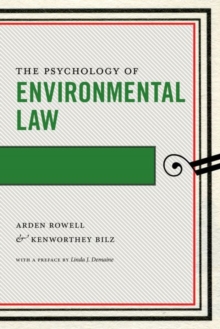
The Psychological Foundations of Evidence Law Hardback
by Michael J. Saks, Barbara A. Spellman
Part of the Psychology and the Law series
Hardback
Description
Identifies and evaluates the psychological choices implicit in the rules of evidenceEvidence law is meant to facilitate trials that are fair, accurate, and efficient, and that encourage and protect important societal values and relationships.
In pursuit of these often-conflicting goals, common law judges and modern drafting committees have had to perform as amateur applied psychologists.
Their task has required them to employ what they think they know about the ability and motivations of witnesses to perceive, store, and retrieve information; about the effects of the litigation process on testimony and other evidence; and about our capacity to comprehend and evaluate evidence.
These are the same phenomena that cognitive and social psychologists systematically study. The rules of evidence have evolved to restrain lawyers from using the most robust weapons of influence, and to direct judges to exclude certain categories of information, limit it, or instruct juries on how to think about it.
Evidence law regulates the form of questions lawyers may ask, filters expert testimony, requires witnesses to take oaths, and aims to give lawyers and factfinders the tools they need to assess witnesses’ reliability.
But without a thorough grounding in psychology, is the “common sense” of the rulemakers as they create these rules always, or even usually, correct? And when it is not, how can the rules be fixed?Addressed to those in both law and psychology, The Psychological Foundations of Evidence Law draws on the best current psychological research-based knowledge to identify and evaluate the choices implicit in the rules of evidence, and to suggest alternatives that psychology reveals as better for accomplishing the law’s goals.
Information
-
Available to Order - This title is available to order, with delivery expected within 2 weeks
- Format:Hardback
- Pages:320 pages
- Publisher:New York University Press
- Publication Date:22/01/2016
- Category:
- ISBN:9781479880041
Other Formats
- Paperback / softback from £32.59
Information
-
Available to Order - This title is available to order, with delivery expected within 2 weeks
- Format:Hardback
- Pages:320 pages
- Publisher:New York University Press
- Publication Date:22/01/2016
- Category:
- ISBN:9781479880041










